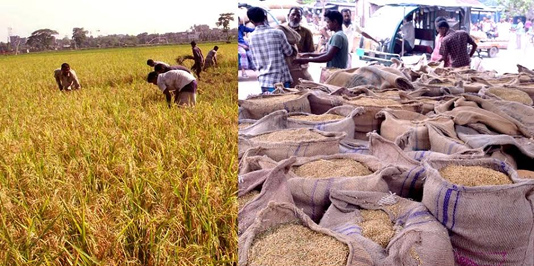Dhaka, May 06 – The government is likely to go for a strategic ‘recovery plan’ in the next budget (2020-19) with a greater focus on agriculture and health sectors to revive the national economy hit hard by the COVID-19 outbreak. Health, agriculture and mega projects will get priority in this recovery plan to make the economy ‘stronger’ so that any such future disaster could be tacked effectively.
“Consultations are going on over a recovery plan in the next budget to put the economy back on track from this stagnation caused by COVID-19 pandemic,” Planning Minister MA Mannan told UNB.
Health, agriculture and mega projects are likely to get priority in this recovery plan, he said.
The minister said there is no scope to deny the fact that the real strength of the health sector to face such a crisis is still weak. “We’ve to enhance the capacity as we’ve lower number of doctors, nurses, ICU and ventilators than what we need,” he said.
MA Mannan mentioned that the country has a lack of essential medical equipment or the absence those is there in many areas of the country.
“If this pandemic reemerges, which is the World Health Organisation has already talked about, then we’ve to remain ready to tackle that…we’ve to upgrade our health sector,” he said.
The minister also thinks that the allocation for the health sector would be a bigger one compared to the previous years.
Talking about the agriculture sector, the Planning Minister said the focus will naturally be on agriculture following the economic setback. “This sector still remains the main driver of our economy. Still, most people are either directly or indirectly involved in this sector. As per my assumption, the government will give the highest priority to this sector,” he said.
He, however, thanked the Almighty and expressed his gratitude to the workforce involved in this sector for having a bumper Boro production this time which will be a great strength for the country during the hard days lying ahead.
But the bureaucrat-turned-politician expressed concern over the availability of fertilisers, including urea and seed, in near future.
“The main companion of the agriculture is fertiliser, we procure urea fertiliser from abroad, without this fertiliser we won’t be able to produce so much of crops. After reviewing, the present stock, we’ve to go for immediate procurement for our next crops,” the minister said.
He said Bangladesh imports seed for its production and this is crucial for the coming days as the whole world is suffering from the COVID-19 outbreak.
Mannan urged the farmers to preserve their own good standard seeds for future to reduce dependence on imported ones. “We’ve to alert those (person or organisation) immediately who import seeds so that we can produce our next crops properly.”
The minister said if the country could produce the next crop without any hindrance then it would be a great relief for the whole economy as it will ensure food security.
Mannan put emphasis on bringing all arable landowners, irrespective of big or small, to use their respective lands for production.
The Planning Minister also stressed the importance of completion of Padma Multipurpose Bridge and Metro Rail in the ‘recovery plan’ which would give a boost to the national economy.
Responding to a query about the transfer of fund as instructed by the Prime Minister from the fast track projects to the government announced stimulus packages, he said this can be done easily as the activities of these projects or spending of money for those are more or less remain suspended due to the pandemic.
“This is possible…there’s no work in these projects for more than a month. Had their activities been on in full swing, then they would have spent the money,” he said.
As they are not spending the money, MA Mannan said, this can be used in the stimulus packages that the Prime Minister announced recently.
“If they cannot work properly before June or they work on a limited scale, then huge money will remain unused in these projects,” he added. – UNB




